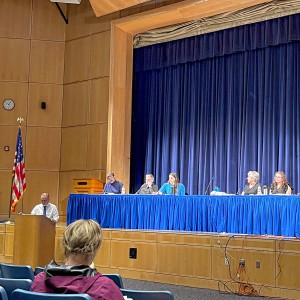My Turn: Lock him up? Why this case tops all
| Published: 08-07-2023 1:24 PM |
This time it really matters. I’m not saying that the federal indictment in Florida — which accuses Trump of absconding with and hiding national security documents and lying to federal law enforcement about possessing those papers and, additionally, destroying evidence of his culpability — doesn’t count.
Quite to the contrary — it does. People have gone to prison for far less.
And I’m not saying with regard to Stormy Daniels that Trump’s falsifying tax and business filings about his hush-money payments somehow didn’t merit the indictments returned in New York. Indeed, such illegalities regularly result in prosecution.
And to be clear — the charges expected in Georgia later this month against Trump for attempting to coerce election officials to reverse that state’s 2020 presidential results will prove important for many reasons. One is that a president has no authority to pardon a state offense.
But of all the criminal charges facing Trump, it is this week’s indictment in Washington, D.C. that matters the most. It matters the most because it tells the story of how Donald Trump has subverted democracy and augured authoritarianism. This indictment goes to the heart of the matter.
The indictment contains four counts, four charges. Three of the charges allege conspiracies, an irony in view of conspiracy charges historically being used against progressives. The 45-page indictment also details how the co-conspirators tried to implement their illegal scheme.
One count alleges a conspiracy to defraud the United States by attempting to rig the national election result. To achieve this goal the co-conspirators, among other things, attempted to have votes counted improperly, to change electoral votes, to recruit fake electors, to get the Justice Department to do its dirty work, and to pressure Vice President Pence to delay certification and reject slates of legitimate electors.
Another count alleges a conspiracy against rights, the right to vote and to have votes counted, based on the same facts. The charges are based on two separate criminal statutes.
Article continues after...
Yesterday's Most Read Articles
 Bridge of Flowers in Shelburne Falls to open on plant sale day, May 11
Bridge of Flowers in Shelburne Falls to open on plant sale day, May 11
 As I See It: Between Israel and Palestine: Which side should we be on, and why?
As I See It: Between Israel and Palestine: Which side should we be on, and why?
 $12.14M school budget draws discussion at Montague Town Meeting
$12.14M school budget draws discussion at Montague Town Meeting
 Greenfield homicide victim to be memorialized in Pittsfield
Greenfield homicide victim to be memorialized in Pittsfield
 Fogbuster Coffee Works, formerly Pierce Brothers, celebrating 30 years in business
Fogbuster Coffee Works, formerly Pierce Brothers, celebrating 30 years in business
 Streetlight decision comes to Shelburne Town Meeting
Streetlight decision comes to Shelburne Town Meeting
In addition, there is a count alleging a conspiracy to obstruct an official proceeding — the joint session of Congress convened to cast the electoral votes on Jan. 6 and an additional count charging the actual obstruction of that official proceeding.
The obstruction count, which federal prosecutors have used successfully against hundreds of people who stormed the Capitol that day, carries a potential penalty of 20 years. The maximum for the conspiracy to defraud is five years.
In this indictment Trump is the only defendant, the only co-conspirator who is named. That’s perfectly legal. Other co-conspirators need not be charged or named.
And this indictment does neither, although the detail it provides has made it easy to identify five of the other six co-conspirators. They are Rudy Giuliani, John Eastman, Sidney Powell, Kenneth Chesebro, and Jeffrey Clark — all attorneys, all with a difficult decision to make.
They can wait to see if the government indicts them and then be tried either with Trump or separately (the government’s choice) which carries the grave risk of spending extended time as a federal prisoner. Alternatively, they could choose to cooperate with the government against Trump. The Mar-a-Lago property manager, Carlos De Oliveira, indicted for destroying video evidence at Trump’s request, faces the same quandary.
But a willingness to negotiate does not guarantee that there will be an agreement between Special Prosecutor Jack Smith’s office and any co-conspirator. Cooperation does not guarantee no jail time. How guilty they are, how big a role they played, how quickly they come to play Let’s Make a Deal, how much their evidence adds to the government’s case — all these factors weigh in the calculation.
Trump’s present criminal travails have raised many legal issues, including whether if elected again, he could serve time while also serving as president. It’s a good question. Trump would argue — perhaps successfully, perhaps not — that states cannot exercise that kind of power over a sitting president. Therefore, any sentence from Georgia or New York could not be imposed until after his next term has expired.
But what about the federal Mar-a-Lago documents case, scheduled for trial in May 2024? After a conviction and sentencing, would the sentence be stayed pending appeal? If not, could Trump run for office from prison and be sworn in if he won? Nothing says he can’t be.
Presumably a conviction could constitute the basis for impeachment should he be elected president again. But even if the House were to impeach, Republicans presumably would argue that because the people elected him knowing the allegations, the Senate should refuse to convict.
In addition to the legal questions, there are political and moral ones. How could this man take over one of the two major political parties? What has happened to the country that elected Barack Obama president? Why don’t we care about values and ethics at the Supreme Court? Why and when did mass murders become an acceptable part of our national life? What has happened?
We are at a crossroads. How Trump’s legal issues and political fortunes are resolved will play a big part in deciding the fundamental, overarching question — in the future, will the United States be able to credibly call itself a democracy?
Bill Newman is a Northampton-based attorney and co-host of Talk the Talk on WHMP.

 Guest columnist Gene Stamell: We know what we know
Guest columnist Gene Stamell: We know what we know Michelle Caruso: Questions candidate’s judgment after 1980s police training incident
Michelle Caruso: Questions candidate’s judgment after 1980s police training incident Kathy Sylvester: Vote for expertise on May 6
Kathy Sylvester: Vote for expertise on May 6 Shirley and Mike Majewski: Vote for Blake Gilmore
Shirley and Mike Majewski: Vote for Blake Gilmore
